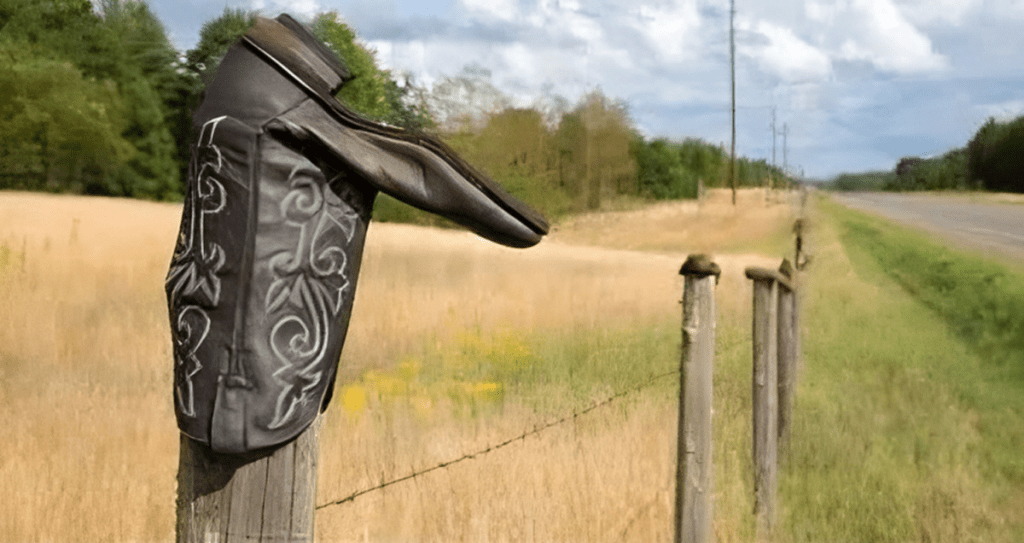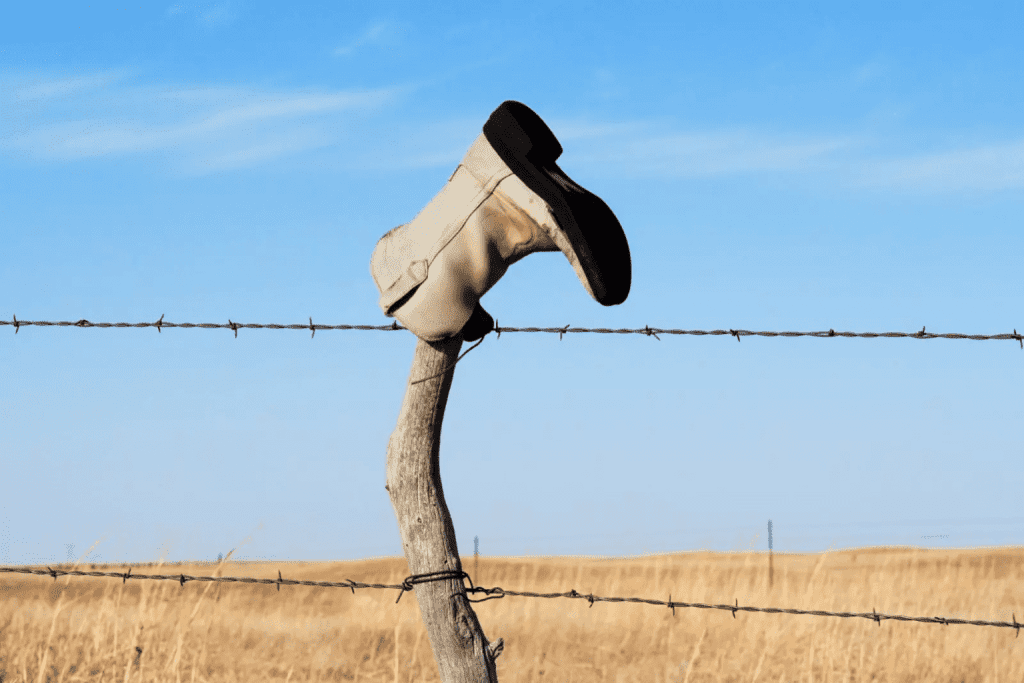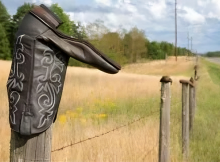If you’ve ever driven through rural America, you might have noticed cowboy boots placed upside down on fence posts. To some, it’s a puzzling sight, while to others, it’s a well-understood tradition that carries deep meaning. So, what exactly does a boot on a fence symbolize? And why should you resist the urge to touch it? Let’s dive into this unique cultural practice and explore the reasons behind it.

The Tradition of Cowboy Boots on Fences
Cowboy boots on fences are more than just an odd decoration—they’re a symbol of something much deeper. In rural communities across America, placing a boot on a fence is a sign of respect, remembrance, or farewell. It’s a tradition that pays homage to something—or someone—important.
Ranchers, farmers, and cowboys are often the ones who maintain this tradition. These boots aren’t just discarded footwear; they’re placed intentionally and often represent a connection to the land, animals, and the people who work on it.
Honoring a Horse: A Tribute of Love and Loss
One of the most common reasons for a cowboy boot to appear on a fence is to honor a beloved horse that has passed away. Horses, like dogs or cats, can become cherished members of a rancher’s family. The bond between a cowboy and his horse is often one of mutual respect and companionship, built over long days of hard work.
When a horse passes away, ranchers sometimes place a pair of their boots on a fence post as a tribute. It’s a symbolic gesture to commemorate the horse’s service, loyalty, and friendship. Just as we might memorialize a family pet, ranchers pay their respects to these trusted companions with this simple yet emotional act. For them, the boots left behind are more than just leather—they represent a shared history, countless miles, and many memories.
The Symbolism of “A Pair of Boots for Every Hand”
In some cases, boots on a fence serve as a tribute to a person rather than an animal. This is often true for ranch hands who have moved on—either to other work or to the great beyond. In cowboy culture, there’s an old saying: “a pair of boots for every hand.” This phrase reflects the idea that every worker deserves recognition for their efforts, whether they’ve left the ranch for a new job or have passed away.
By placing boots on the fence, ranchers acknowledge the contributions of these individuals. It’s a way of saying goodbye while also honoring their hard work and dedication. The boots left behind symbolize the grit, sweat, and determination that it takes to work the land. In these cases, disturbing the boots would be akin to disrespecting the memory of someone who gave their all to the ranch.

Why You Should Never Touch a Cowboy Boot on a Fence
So, why is it so important not to touch or move a cowboy boot left on a fence? The answer is simple: respect. These boots often serve as personal memorials. To tamper with them is to disrupt someone’s way of honoring a horse, a ranch hand, or a loved one.
Imagine if you visited a cemetery and saw someone moving headstones around—such behavior would be considered incredibly disrespectful. The same sentiment applies to boots left on fences in rural America. While they may not have the solemnity of a cemetery, these boots carry significant emotional weight.
If you see a boot on a fence, think of it as a silent marker of a life lived or a friendship cherished. The best thing you can do is simply leave it as you found it.
A Deeper Cultural Meaning: The Cowboy Code of Respect
The tradition of leaving boots on fences is also connected to a broader code of conduct often observed in cowboy culture. This unwritten “cowboy code” emphasizes respect, honor, and loyalty. For generations, cowboys have prided themselves on these values, both in their work and in their interactions with others.
By understanding and respecting the meaning behind boots on a fence, you’re not just avoiding an awkward faux pas—you’re acknowledging a unique cultural practice. You’re showing the same respect that ranchers and cowboys extend to their horses, fellow workers, and the land itself.
The Emotional Connection to Boots and Loss
For many ranchers, losing a horse or a close ranch hand can be as devastating as losing a family member. This makes the act of placing boots on a fence an emotional one. It’s a way to process grief, honor memories, and find closure.

Imagine the journey those boots have taken—long days in the saddle, the dust of countless trails, and the worn marks from daily chores. These boots tell stories of the person or horse who wore them. For the one leaving them behind, it’s an act of letting go, but also a way to ensure that the memories never fade completely.
Cowboy Boots as Symbols of the American West
Cowboy boots are a significant symbol of the American West. They represent a rugged lifestyle, a connection to the land, and a sense of freedom that defines cowboy culture. When these boots find their final resting place on a fence, they become a marker of life, love, and loss in the wide-open spaces of rural America.
Beyond their practical purpose, cowboy boots embody resilience, hard work, and a deep sense of independence. By leaving a boot on a fence, ranchers are not just honoring a loss—they’re also celebrating a lifestyle that’s as much about the spirit of the West as it is about the land itself.
Conclusion: Leave the Boots Alone, Respect the Tradition
If you come across a cowboy boot perched on a fence, remember that it’s more than just an old piece of leather—it’s a heartfelt tribute. Whether it honors a beloved horse or a hardworking ranch hand, the boot deserves to remain untouched, serving as a silent testament to a unique culture.
In a world that often rushes past the symbols and traditions of rural life, the boots on a fence serve as a reminder of the deep emotional ties that connect people to the land, to animals, and to each other. So, the next time you see a lone boot standing watch on a fence post, tip your hat and move along—it’s a part of the West’s legacy that deserves your respect.

